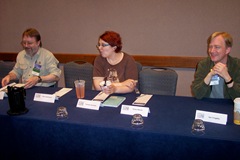 This was a big panel with about 15 speakers: Christopher McKitterick, Marziah Karch, James K. Burk, Jan Gephardt, Chloe Neill, Dana Bell, Michael Swanwick, Laura LeHew, Rob Chilson, Robin Wayne Bailey, Julia S. Mandala, Dennis Young, Tammy Garrison, Tracy Morris, and Ian Tregillis. (I was a bit surprised that they did not put Toni Weisskopf on the panel, given her experience in e-book-related matters.)
This was a big panel with about 15 speakers: Christopher McKitterick, Marziah Karch, James K. Burk, Jan Gephardt, Chloe Neill, Dana Bell, Michael Swanwick, Laura LeHew, Rob Chilson, Robin Wayne Bailey, Julia S. Mandala, Dennis Young, Tammy Garrison, Tracy Morris, and Ian Tregillis. (I was a bit surprised that they did not put Toni Weisskopf on the panel, given her experience in e-book-related matters.)
They took turns speaking on what e-books meant to them, and what they saw in the immediate future. Here are the highlights of what they said/
Michael Swanwick said that he sees e-books as taking the place of those paperbacks you buy in an airport. He first encountered the Kindle when Neil Gaiman was beta-testing it. Swanwick quoted Gaiman as saying that “It’s inferior to any book, but superior to any library” for the way it was possible to load hundreds of books onto the device to take anywhere.
Ian Tregillis was concerned about how e-book sales might affect his contractual relationship with his publisher. “When you get a book coming out, you hear people saying they don’t want to pay hardcover prices, they’re going to buy it as an e-book.”
While he was happy to have people reading his books, Tregillis said, whether the book was a success or failure was based on the number of people buying it in hardcover. He was concerned that e-book sales might make his publisher less likely to buy additional books from him.
 Chloe Neill said her royalties were higher for e-books, and that she loved her e-book reader for travel. “It also creates pricing flexibility, particularly for genre novels. When people don’t want to pay $12 for a paperback, they might pay $8 for an e-book since they don’t need to have it on their library shelf. Some fans who want hardback will buy hardback the day it comes out.”
Chloe Neill said her royalties were higher for e-books, and that she loved her e-book reader for travel. “It also creates pricing flexibility, particularly for genre novels. When people don’t want to pay $12 for a paperback, they might pay $8 for an e-book since they don’t need to have it on their library shelf. Some fans who want hardback will buy hardback the day it comes out.”
Several of the authors pointed out the benefit that e-books had for midlist writers. James K. Burk pointed out that publishers were dropping midlist writers even though in the aggregate midlist writers made a lot of money for publishers, choosing instead to go after bestsellers and the attendant reputation increases. “Publishers are falling more and more on a gamble, that ‘our political felon is better than the other guy’s political felon.’”
Tracy Morris said, “The way the market has shifted, it used to be you could make a respectable living as midlist authors. Then when beancounters like Barnes & Noble took over, the midlist evaporated. With digital, some publishers are taking risks on midlist authors again.”
Other issues that were brought up included the difficulty of finding the right e-book when you can’t simply go into a bookstore and browse the shelves, and also the compatibility problem. Tammy Garrison, a librarian, mentioned an experience her library had with getting digital archives that turned out to be in a format they couldn’t use, and having to spend thousands of dollars to convert them into PDF. On the other hand, she could open a paper book from 1600 and it would still be perfectly readable.
One audience member brought up the erotica issue—if she was going to be reading a book at her desk, e-books would allow her to have what she wanted to read there without anyone else knowing about it from seeing the cover. She also noted that her e-book collection had a distinct advantage over her printed collection—it was a lot easier to find an e-book on her hard drive than dig through her 3,500 books that were boxed up in her closet.
One audience member brought up the argument for illicit downloading as advertising, saying that he downloaded music and, if he liked it, he would go buy the CD. Some panelists were skeptical, however.
 Dennis Young pointed out there is a big difference between downloading music and books—if you download a song, you might have reason to buy the whole album. However, a book is like a whole album—you don’t download a chapter, you download the whole thing.
Dennis Young pointed out there is a big difference between downloading music and books—if you download a song, you might have reason to buy the whole album. However, a book is like a whole album—you don’t download a chapter, you download the whole thing.
One member of the audience wondered whether future generations would come to prefer e-books over other kinds of book. Marziah Karch (whose 8-year-old daughter was sitting in the front row playing with her mother’s iPad) pointed out that she’d had a computer since she was her daughter’s age, but had not grown up to like reading any less for it.
Another audience member wondered what e-books would mean for libraries. Garrison talked about services such as Overdrive that checked out library e-books. She said that there were some conflicts in the library world as some e-book publishers wanted to get paid every time an e-book was checked out, as opposed to the first-sale-based lending of printed books.
It was a very interesting panel, though unfortunately it ended before I could bring up some issues such as the matters of quality control and region restriction. Still, the panelists had clearly given e-book-related matters a lot of thought and it was fascinating to hear e-book thoughts from a collection of so many different writers all at once.
































